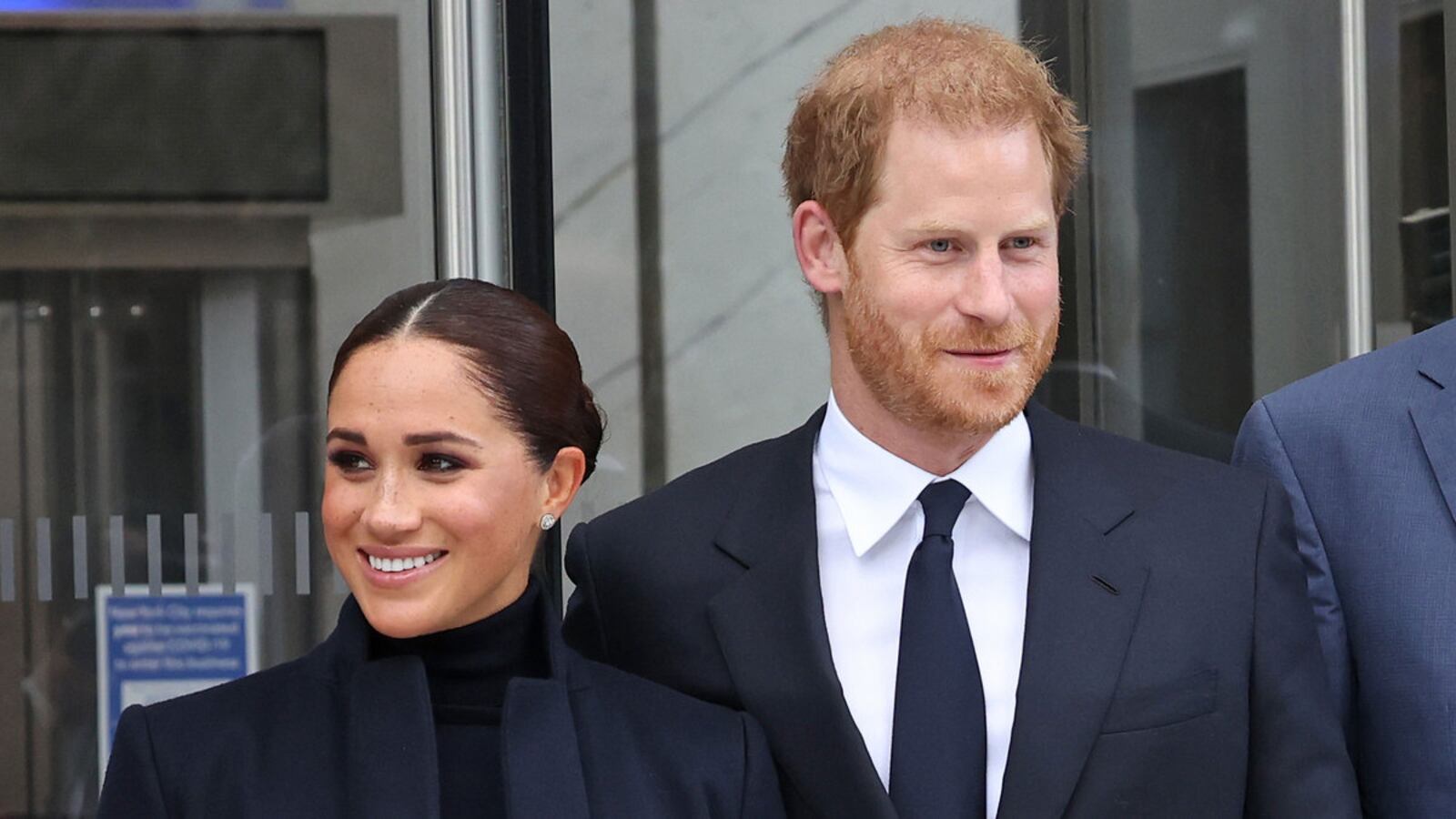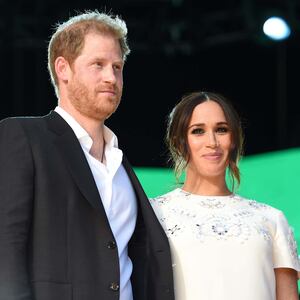If Meghan Markle thought cold-calling Republican senators to persuade them to sign up to paid family leave policies would be a breeze, or even a good idea, she has been proven wrong. Online criticism has inevitably followed, especially as she introduced herself using her royal title, the Duchess of Sussex.
Politico reported that Meghan had called both Sen. Shelley Moore Capito (R-WV) and Sen. Susan Collins (R-Maine). The former said, “And she goes, ‘Senator Capito?… This is Meghan, the Duchess of Sussex,’” Capito recalled to Politico. “I couldn’t figure out how she got my number,” Capito said. (New York Democrat Senator Kirsten Gillibrand reportedly shared the two senators’ phone numbers with Meghan.)
“Much to my surprise, she called me on my private line and she introduced herself as the Duchess of Sussex, which is kind of ironic,” Collins said, referring to how Meghan and Harry have set themselves up in a new life far away from the palace—while criticizing royal life, most infamously in the interview they gave to Oprah Winfrey.
“I was happy to talk with her. But I’m more interested in what the people of Maine are telling me about it,” Collins said of the call she received.
The latest political brouhaha followed the small contribution made from afar by Prince Harry and Meghan to this week’s COP26 climate summit. They promised to make all activities of their umbrella company, Archewell, carbon neutral by 2030.
The announcement on the Archewell website was welcome, but its smallness in comparison to the starring role played by the royals at this week’s sustainability jamboree in Glasgow served also to highlight the couple’s conspicuous absence from the event.
The COP26 gathering is just the kind of place where one might have expected to see the couple in full campaigning mode. After all, as they said in their statement on Wednesday, they “have a long-standing commitment to the planet, both together and prior to their union, with global projects and partnerships dating back over a decade.”
But with the royals dominating the show, and given the extent of ill-feeling between Montecito and Windsor, it would have been politically awkward for Meghan and Harry to attend, let alone make speeches.
Alongside Meghan’s calls to senators, it is a situation that raises a number of interesting questions about the boundaries of the political (in the broadest sense of the word) future of Harry and Meghan.
As many commentators observed, Harry was very much not included in a pre-recorded speech by Queen Elizabeth II played to delegates on Monday night.
The queen, apparently recovering from her mystery health crisis, told delegates: “It is a source of great pride to me that the leading role my husband played in encouraging people to protect our fragile planet, lives on through the work of our eldest son, Charles, and his eldest son, William. I could not be more proud of them. Indeed, I have drawn great comfort and inspiration from the relentless enthusiasm of people of all ages, especially the young, in calling for everyone to play their part.”
The exclusion of Harry, who has long campaigned on environmental issues, was striking.
Of course, the queen can’t be expected to mention every member of her family every time she speaks, but the omission of Harry was an unvarnished illustration of the realities of the new royal order. It appears to be part of a deliberate effort by the queen to put clear blue water between the “life of public service” which she sees as comprising her family’s activities and the “universal” obligation to service that Harry and Meghan claimed in a February 2020 statement.
The non-involvement of Harry and Meghan in COP26 could be seen as pegging out the limits of their influence now they are very firmly outside the royal tent.
Of course, this is in one sense an entirely logical outcome of the decisions they took last year. The political journalist Ian Dunt, columnist for the UK’s i newspaper and author of How To Be A Liberal, told The Daily Beast: “The reason we sometimes get confused about the royal family is because it is an institution that looks like a family. We take these statements from the queen about her ‘family’ as if she is actually talking about her family; in fact she is talking about an institution grounded in familial relations.
“Harry and Meghan left that institution. The upside is that they can now talk about a much wider breadth of issues. The downside is that they do so with less authority; they don’t have institutional weight behind them.”
To be sure, one challenge that Harry and Meghan face in their new life as non-royal activists is maintaining the sense of gravitas that royalty bestows on individuals.
As Sean O’Grady, the associate editor of British newspaper the Independent, told The Daily Beast: “They are famous enough and celebrated enough to make themselves heard, but without the platform of royalty but they are basically celebs. Their position is more like that of Leonardo DiCaprio, who turned up at Glasgow this week, than of Prince William.”
Dunt also thinks that lectures about the climate from royals are perhaps less irritating to many people than the same lectures from mere celebrities: “The public do recognize that while there are plenty of good things about being a royals—like money and palaces—there are also very real and severe restrictions on the life of a royal. You’ve got to get up early, you’ve got to go to a lot of places that might not be that interesting and you have got to shake a lot of hands.
“Harry and Meghan are not doing those bits anymore, and there is a moral argument that having got rid of all the bad parts of royal life, there is a commensurate reduction in moral authority.”
But while the couple may perhaps be lacking invites to COP26 or other global events where the royals parlay with world leaders, they are still plainly enormously influential private citizens, who will be hugely sought after by fundraisers and would be immensely valuable additions to any cause they choose to bestow with the honor of their imprimatur.
The perspective of insiders in the philanthropic world is instructive in this regard. Lizzie Asher, philanthropist and founder of the Cura Collective)" href="https://urldefense.com/v3/__https://www.curacollective.org/__;!!LsXw!G3TVKyIOKEZP5S5kWGavTpTkv0AX5ojxRQ-sObigjrd35pVAY9V0QNo4agtzzIgPMiBGPA$">Cura Collective, told The Daily Beast she was “perplexed” by the “kerfuffle” over the queen’s failure to namecheck Harry, saying, “Charles and William are actual working Royals. Harry chose not to be. I think he and therefore Meghan remain viable headliners for many non-profits, especially on this side of the pond. They are forging a new path for themselves here. I am hopeful that their words will translate to commitments that eventually will make them worthy headliners due to their work and accomplishments, not merely by the accident of having a title of Duke or Duchess before their names.”
Charles Keidan, Executive Editor of Alliance, a magazine focused on philanthropy, said of the couple, “They might be somewhat marginalized in terms of that very elite role that a small number of royals play, but they are now able to speak out freely on issues they formerly were not able to, such as racial and social justice.”
“They are free to be global citizens and earn their own money—and channel those resources into social causes they are interested in. They might see the benefits of that as outweighing the costs.”
And, of course, as O’Grady points out, the Sussexes have one other very valuable tool in their armory: brand longevity.
“What sets Harry apart from all the other celebs is that Harry can’t stop being the queen’s grandson, he can’t stop being the brother of the future king. He will always be famous, so he will always have influence,” O’Grady says.
It might just be of a rather different kind to that wielded by his brother in years to come.






